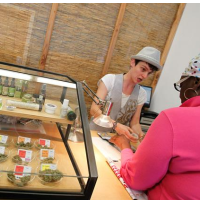It’s Open Season on Pot Dispensaries after State Supreme Court Signs off on Local Bans
 Harborside Health Center in Oakland (photo: Associated Press)
Harborside Health Center in Oakland (photo: Associated Press)
Around 200 local jurisdictions in California that have passed ordinances banning medical marijuana dispensaries, or want to, are poised to crack down on those that remain open in the wake of Monday’s California Supreme Court decision upholding their closure.
Ten of the 30 dispensaries in San Bernardino closed immediately after the high court decision was announced and City Attorney James F. Penman told the Daily Bulletin the city had barely begun to take action. “We're focusing on closing them down, then we will be going after the owners of the properties that allowed these illegal operations to operate and we will be going after them for administrative civil penalties.”
Many dispensaries throughout the state have stayed open despite local ordinances that banned them as both law enforcement and shop owners waited to see whether the high court would let cities be more restrictive than the state law that allows them.
The court unanimously ruled Monday that cities could ban them outright, agitating the schizophrenia that governs use of medical marijuana in the state. Marijuana is illegal under federal law; California voters legalized it in 1996 for medical use; some local jurisdictions have banned it; and local, state and federal courts are considering myriad cases about various aspects of the drug’s use.
The high court ruled in a case out of Riverside that although state law gives medical marijuana cooperatives and collectives a limited exemption from state criminal liability, “state law does not ‘authorize’ activities, to the exclusion of local plans.” The court said if the Legislature wants to prevent local jurisdictions from banning medical marijuana, it should pass a law that clearly does so.
The U.S. Department of Justice has aggressively pursued dispensary owners throughout the state since the end of 2011, despite assurance from President Barack Obama and Attorney General Eric Holder that the federal government had no interest in a marijuana crackdown. The estimated $1.3 billion-a-year industry, which was launched after the state legalized collectives and cooperatives in 2006, supplies medical marijuana to hundreds of thousands of people.
In addition to those cities with bans already in place, a number of jurisdictions are expected to enact bans of their own based on land-use zoning ordinances. San Jose Mayor Chuck Reed told the Mercury News that, in light of the decision he would pursue a “balanced approach to regulating medicinal marijuana.”
Los Angeles, which has an estimated 1,000 pot shops, will hold a vote on three dispensary measures May 21. Measure D was put on the ballot by the City Council and would allow 130 dispensaries, Measure E is similar enough to it that its supporters now back Measure D, and Measure F would allow an unlimited number of shops with certain restrictions.
If none of the measures pass, the City Council could revisit a ban it voted for last year before quickly withdrawing it under fire.
–Ken Broder
To Learn More:
Local Governments to Go after Medical Marijuana Dispensaries with Support from State Supreme Court (by Sandra Emerson, Wes Woods II and Ryan Hagen, Inland Valley Bulletin)
California Supreme Court Allows Cities to Ban Weed Dispensaries (by Howard Mintz, San Jose Mercury News)
Calif. Pot Shop Owner Who Lost Court Battle Closes (by Greg Risling, Associated Press)
Medical Marijuana Measures Await Vote (by Megan Diskin, Daily Sundial)
City of Riverside v. Inland Empire Patient's Health and Wellness Center (California Supreme Court)
- Top Stories
- Controversies
- Where is the Money Going?
- California and the Nation
- Appointments and Resignations
- Unusual News
- Latest News
- California Forbids U.S. Immigration Agents from Pretending to be Police
- California Lawmakers Urged to Strip “Self-Dealing” Tax Board of Its Duties
- Big Oil’s Grip on California
- Santa Cruz Police See Homeland Security Betrayal in Use of Gang Roundup as Cover for Immigration Raid
- Oil Companies Face Deadline to Stop Polluting California Groundwater





